FDA Exculpatory Language in Informed Consent
标准简介
Exculpatory Language in Informed Consent[附网盘链接]是于不久前发布的FDA标准,适用于美国。标准截图
![Exculpatory Language in Informed Consent[附网盘链接]](/img/20210914103746752e7.jpg)
标准文档说明
标准文档类型为Exculpatory Language in Informed Consent[附网盘链接]高清PDF版本(文字版),标准文档内可进行搜索,可以复制原文,可粘贴。标准部分原文
Draft — Not for Implementation Guidance on Exculpatory Language in Informed Consent This draft guidance, when finalized, will represent the Office for Human Research Protections’ (OHRP’s) and the Food and Drug Administration’s (FDA’s) current thinking on this topic. This guidance does not create or confer any rights for or on any person and does not operate to bind OHRP, FDA or the public. OHRP and FDA guidance should be viewed as recommendations unless specific regulatory requirements are cited. The use of the word must in OHRP and FDA guidance means that something is required under the Department of Health and Human Services (HHS) regulations at 45 CFR part 46 or the Food and Drug Administration regulations at 21 CFR parts 50 and 56. The use of the word should in OHRP and FDA guidance means that something is recommended or suggested, but not required. You can use an alternative approach if the approach satisfies the requirements of the applicable statutes and regulations. If you want to discuss an alternative approach, contact the OHRP or FDA staff responsible for 1
implementing this guidance. I. INTRODUCTION This draft guidance has been prepared jointly by the Office for Human Research Protections (OHRP) and the Food and Drug Administration (FDA). This document applies to non-exempt human subject research conducted or supported by the Department of Health and Human Services (HHS) and is intended for clinical investigators, institutional review boards, and funding agencies that may be responsible for review or oversight of human subject research conducted or supported by HHS. This document also applies to human subject research regulated by FDA and is intended for clinical investigators, sponsors, and institutional review boards conducting or reviewing such research. This document provides guidance on the regulatory prohibition on the inclusion of exculpatory language in informed consent. The document includes examples of language that OHRP and FDA consider acceptable as well as examples of language that the agencies would consider exculpatory. When finalized, this document will supersede OHRP’s November 15, 1996, guidance entitled, “‘Exculpatory Language’ in Informed Consent” and question number 52 in FDA’s January 1998 guidance entitled, “Institutional Review Boards Frequently Asked Questions – Information Sheet Guidance for Institutional Review Boards and Clinical Investigators.” OHRP’s and FDA’s guidance documents, including this guidance, do not establish legally enforceable responsibilities. Instead, guidances describe OHRP’s and FDA’s current thinking on a topic and should be viewed only as recommendations, unless specific regulatory or statutory requirements are cited. II. DISCUSSION 1
Contact information for both OHRP and FDA can be found in Section III of this guidance.
网盘链接
百度网盘:https://pan.baidu.com/s/1HjnGtUaxaY9YZT8jgAyiVg
提取码:zbe7
【温馨提示】大资料ISO是提供信息发布的专业信息类网站,所有内容均由用户发布,不代表本站观点,本站亦不存储所涉及的文件及资料。如有【免费资料】以及【付费资料】,请用户根据自己的需求,自行判断是否需要获取。如有交易诈骗、内容侵权可发送邮件至kf@dzl100.com,我们审查后若发现情况属实,会立即对相关内容进行删除处理。
加载用时:48.8385 毫秒
相关评论
相关文章
-
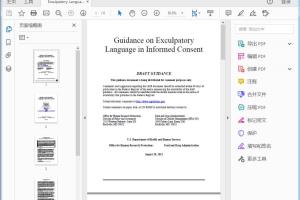
FDA Exculpatory Language in Informed Consent
Exculpatory Language in Informed Consent[附网盘链接]是FDA于不久前发布的FDA标准,适用于美国。本次分享的标准文档为高清PDF(文字版),标准文档内可搜索,可复制,可粘贴。本文结尾附网盘链接。
-
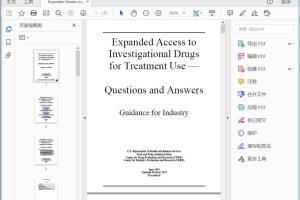
FDA Expanded Access to Investigational Drugs for Treatment Use - Questions and Answers
Expanded Access to Investigational Drugs for Treatment Use - Questions and Answers[附网盘链接]是Food&Drug Administration于不久前发布的FDA标准,适用于U.S。本次分享的标准文档为高清PDF(文字版),标准文档内可搜索,可复制,可粘贴。本文结尾附网盘链接。
-

FDA Exculpatory Language in Informed Consent
Exculpatory Language in Informed Consent[附网盘链接]是FDA于不久前发布的FDA标准,适用于美国。本次分享的标准文档为高清PDF(文字版),标准文档内可搜索,可复制,可粘贴。本文结尾附网盘链接。
-
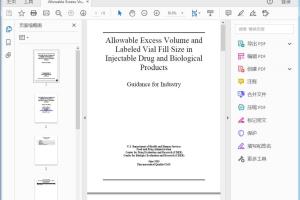
FDA Allowable Excess Volume and Labeled Vial Fill Size in Injectable Drug and Biological Products
Allowable Excess Volume and Labeled Vial Fill Size in Injectable Drug and Biological Products[附网盘链接]是Food And Drug Administration于不久之前发布的FDA标准,适用于US。本次分享的标准文档为高清PDF(文字版),标准文档内可搜索,可复制,可粘贴。本文结尾附网盘链接。
-
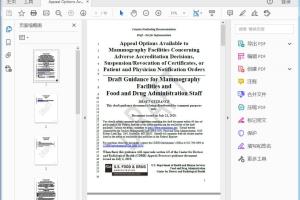
FDA Adverse Accreditation Decisions, SuspensionRevocation of Certificates, or Patient and Physician Notification Orders Draft
Adverse Accreditation Decisions, SuspensionRevocation of Certificates, or Patient and Physician Notification Orders Draft[附网盘链接]是Food And Drug Administration于不久之前发布的FDA标准,适用于United States。本次分享的标准文档为高清PDF(文字版),标准文档内可搜索,可复制,可粘贴。本文结尾附网盘链接。
-
![CVM GFI #185 (VICH GL43) Target Animal Safety for Veterinary Pharmaceutical Products.pdf[网盘链接]](/img/small/20210914103659dm8zg.jpg)
CVM GFI #185 (VICH GL43) Target Animal Safety for Veterinary Pharmaceutical Products.pdf[网盘链接]
GFI #185 (VICH GL43) Target Animal Safety for Veterinary Pharmaceutical Products.pdf是于发布的标准,适用于。本次分享的标准文档为高清PDF(文字版),标准文档内可搜索,可复制,可粘贴。本文结尾附网盘链接。
-
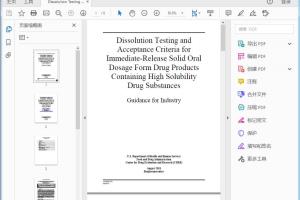
FDA Dissolution Testing and Acceptance Criteria for Immediate-Release Solid Oral Dosage Form Drug Products Containing High Solubility Drug Substances
Dissolution Testing and Acceptance Criteria for Immediate-Release Solid Oral Dosage Form Drug Products Containing High Solubility Drug Substances[附网盘链接]是FDA于过去发布的FDA标准,适用于美国。本次分享的标准文档为高清PDF(文字版),标准文档内可搜索,可复制,可粘贴。本文结尾附网盘链接。
-
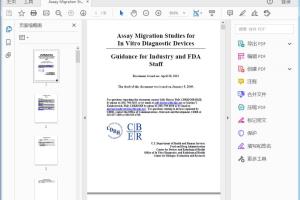
FDA Assay Migration Studies for In Vitro Diagnostic Devices Guidance for Industry and FDA Staff
Assay Migration Studies for In Vitro Diagnostic Devices Guidance for Industry and FDA Staff[附网盘链接]是FDA于过去发布的FDA标准,适用于United States。本次分享的标准文档为高清PDF(文字版),标准文档内可搜索,可复制,可粘贴。本文结尾附网盘链接。
-
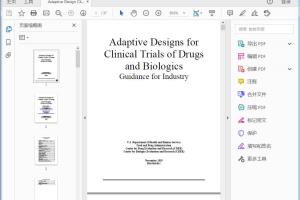
FDA Adaptive Design Clinical Trials for Drugs and Biologics Guidance for Industry
Adaptive Design Clinical Trials for Drugs and Biologics Guidance for Industry[附网盘链接]是FDA于过去发布的FDA标准,适用于美国。本次分享的标准文档为高清PDF(文字版),标准文档内可搜索,可复制,可粘贴。本文结尾附网盘链接。
-

FDA Clinical Pharmacology Labeling for Human Prescription Drug and Biological Products — Content and Format
Clinical Pharmacology Labeling for Human Prescription Drug and Biological Products — Content and Format[附网盘链接]是Food And Drug Administration于当前发布的FDA标准,适用于United States。本次分享的标准文档为高清PDF(文字版),标准文档内可搜索,可复制,可粘贴。本文结尾附网盘链接。
-

FDA Converting Units of Measure for Folate, Niacin, and Vitamins A, D, and E on the Nutrition and Supplement Facts Labels
Converting Units of Measure for Folate, Niacin, and Vitamins A, D, and E on the Nutrition and Supplement Facts Labels[附网盘链接]是Food And Drug Administration于不久前发布的FDA标准,适用于US。本次分享的标准文档为高清PDF(文字版),标准文档内可搜索,可复制,可粘贴。本文结尾附网盘链接。
-

FDA Chronic Hepatitis D Virus Infection Developing Drugs for Treatment Guidance for Industry
Chronic Hepatitis D Virus Infection Developing Drugs for Treatment Guidance for Industry[附网盘链接]是Food&Drug Administration于当前发布的FDA标准,适用于United States。本次分享的标准文档为高清PDF(文字版),标准文档内可搜索,可复制,可粘贴。本文结尾附网盘链接。
-
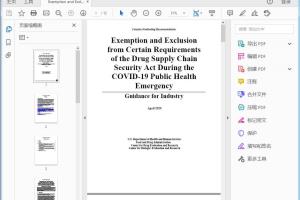
FDA Exemption and Exclusion from Certain Requirements of the Drug Supply Chain Security Act During the COVID-19 Public Health Emergency
Exemption and Exclusion from Certain Requirements of the Drug Supply Chain Security Act During the COVID-19 Public Health Emergency[附网盘链接]是Food And Drug Administration于当前发布的FDA标准,适用于United States。本次分享的标准文档为高清PDF(文字版),标准文档内可搜索,可复制,可粘贴。本文结尾附网盘链接。
-

FDA Coronary Drug-Eluting Stents — Nonclinical and Clinical Studies -Companion Document
Coronary Drug-Eluting Stents — Nonclinical and Clinical Studies -Companion Document[附网盘链接]是FDA于当前发布的FDA标准,适用于美国。本次分享的标准文档为高清PDF(文字版),标准文档内可搜索,可复制,可粘贴。本文结尾附网盘链接。
-

FDA Compliance Policy for the Quantity of Bioavailability and Bioequivalence Samples Retained Under 21 CFR 320.38(c)
Compliance Policy for the Quantity of Bioavailability and Bioequivalence Samples Retained Under 21 CFR 320.38(c)[附网盘链接]是FDA于不久前发布的FDA标准,适用于U.S。本次分享的标准文档为高清PDF(文字版),标准文档内可搜索,可复制,可粘贴。本文结尾附网盘链接。